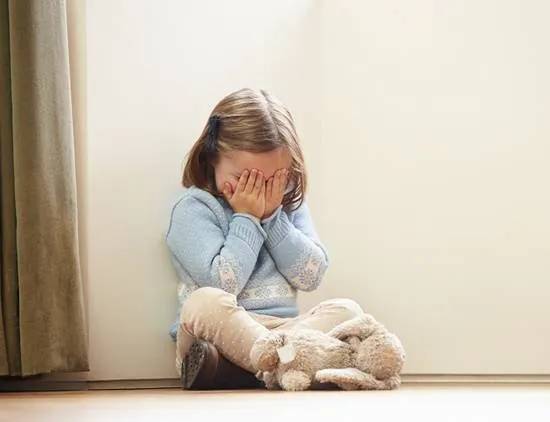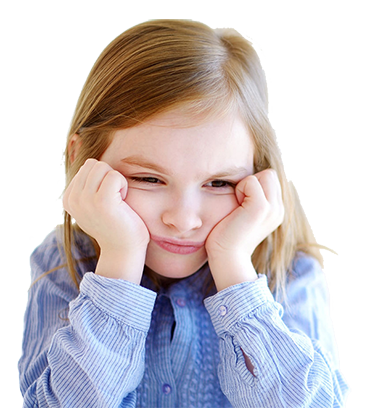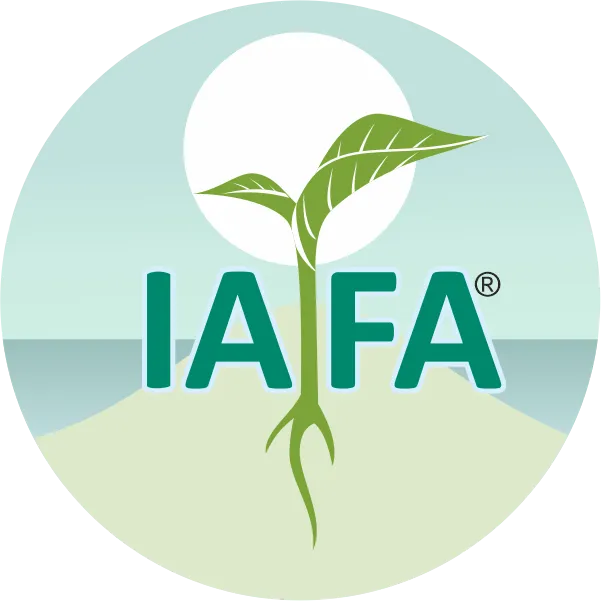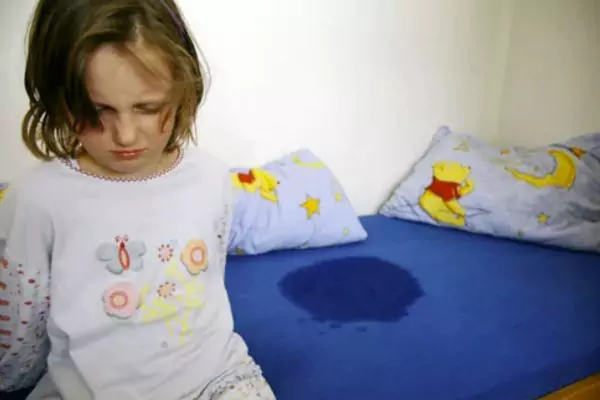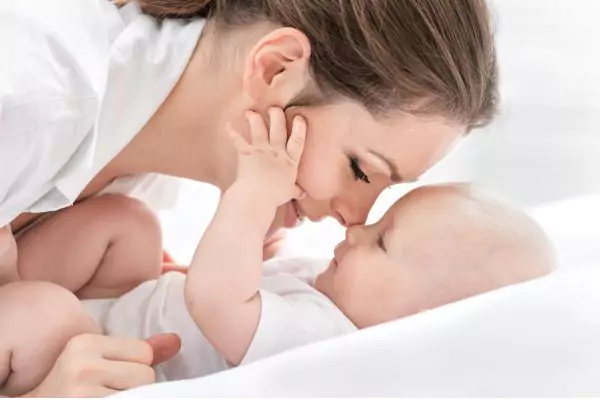On This Page
Depression-Unmada
उन्मादंपुनर्मनोबुद्धिसञ्ज्ञाज्ञानस्मृतिभक्तिशीलचेष्टाचारविभ्रमंविद्यात्||५|| (च.चि.१/५)
Depression is a common mental disorder in children characterized by sadness, loss of interest or pleasure, feelings of guilt or low self -worth disturbed sleep or appetite, feelings of tiredness and poor concentration. Major depressive disorder is one of the most commonly encountered psychiatric disorder. According to World Health Organization, depression is the leading cause of disability. Things that increase the risk of depression in children include,family difficulties, bullying, physical, emotional or sexual abuse, a family history of depression or other mental health problems.
In Ayurveda the condition can be correlated to Unmada., In Unmada the disruption of Manas (mind) and other higher faculties like buddhi (intellect), samjnajnana (con- sciousness), smrithi (memory), bhakti (desire), sheela (manner), cheshta (behavior) and achara (conduct) takes place. Kaphaja Unmada, one among the four types of Nija Unmada explained in the Samhitas, gives lot of similarities with Depression.
Causes of Depression
Rather than cause, the most common risk factors for major depression in childhood include,
- Family history of depression (especially if a parent experienced depression as a child or adolescent)
- Excessive stress
- Abuse or neglect
- Trauma (physical and/or emotional)
- Other psychiatric disorders
- Loss of a parent, caregiver, or other loved one
- Cigarette smoking
- Loss of a relationship (for example, moving away, loss of boyfriend or girlfriend)
- Other chronic illnesses
- Other developmental, learning, or conduct disorders
In Ayurveda, the causes include,
- Bhiruta (timidity)
- Upaklishtasatva (agitated/disturbed mental status)
- Alpasatva (feeble minded)
- Vyadhivegasamusamudbhrama (perturbation due to the severity of disease)
Symptoms of Depression
Symptoms of depression in children often include:
- sadness, or a low mood that does not go away
- being irritable or grumpy all the time
- not being interested in things they used to enjoy
- feeling tired and exhausted a lot of the time
- have trouble sleeping or sleep more than usual
- not be able to concentrate
- interact less with friends and family
- be indecisive
- not have much confidence
- eat less than usual or overeat
- have big changes in weight
- seem unable to relax or be more lethargic than usual
- talk about feeling guilty or worthless
In Ayurveda, the symptoms include
- Sthanamekadeshe: Inactive /dull/likes to be alone
- Alpachankraman/Alpacheshta/cheshta manda: Reduced Psychomotor activity
- Alpa kathanam /mandavak /Tooshnibhava: Sadness of mood
- Rahasyakamata /vivikta priyata: Prefer or love for Solitude
- Bhibhatsatva /saucha dvesha: Ignoring personal hygien, hating Cleanliness
- Sadana: Fatigue
Ayurvedic Reference of Depression-Unmada
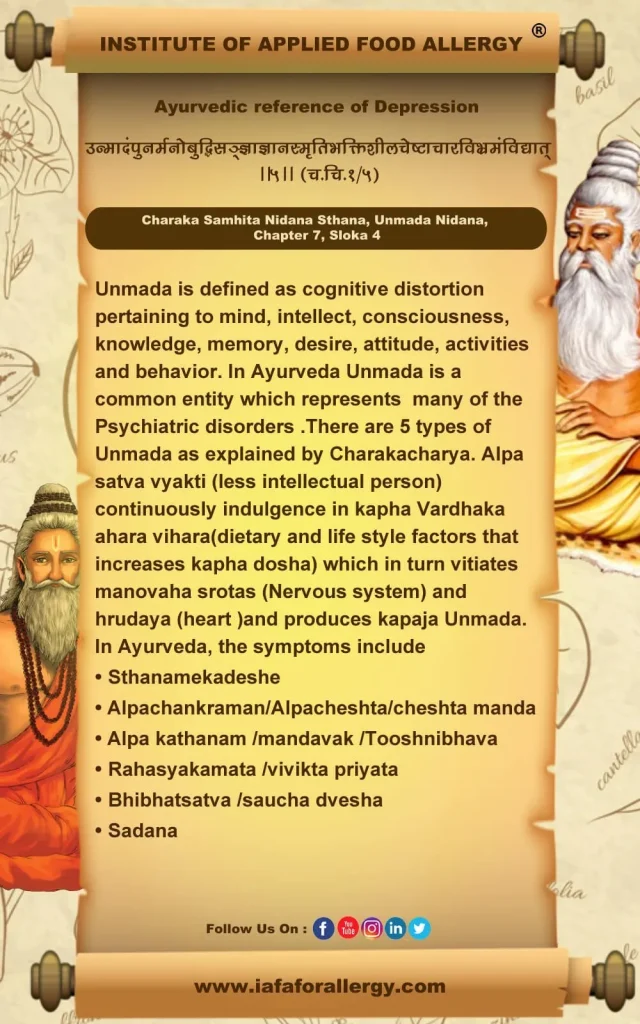

“Dr. Gupta’s IAFA offers effective Ayurvedic Management for Depression in children. Institute of Applied Food Allergy® is committed towards providing the outstanding service for all the health problems of your children through Ayurveda”.
Better health of children, Better future!!! Think about Dr.Gupta’s IAFA!!!
– Dr. Sahil Gupta (B.A.M.S., M.H.A.)
Ayurvedic Allergy Specialist
CEO & Founder of IAFA®
At last, Easier Depression Management

Trusted by
More than 90,000 Patients

Convenient
at-Home Treatments

9.2 / 10
Customer Satisfaction Score
Ayurvedic Treatment for Depression
Ayurveda approach Unmada in a holistic approach with due importance to the logic -based pharmacotherapy, Panchakarma interventions and psychotherapy in the form of spiritual and psychological interventions.
Internal Medicines for Depression
- Ashwagandharishta
- Saraswatharishta
- Saraswatha churna
- Manasamitra gutika
- Dhanvantara Ghrita
- Panchgavya Ghrita
- Brahmi Ghrita
- Mahakalyanaka Ghrita
- Chetasa Ghrita
- Mahapaishachika Ghrita
- Lashunadya Ghrita
External Therapies for Depression
- Nasya (nasal instillation)
- Abhyanga (aneling)
- Takradhara / Ksheeradhara / Tailadhara / Kashayadhara (Streaming of medicated buttermilk / milk / oil / decoction, on the forehead of the patient)
- Mastishkya (application of medicated wet cakes on the vertex)
- Shirolepa (application of medicated wet cakes on head)
- Dhoopana (fumigation)
- Anjana (collyrium)
Purificatory Therapies for Depression
- Vamana (emesis)
- Virechana (purgation)
- Asthapanavasti (medicated enema)
- Raktamokshana (blood-letting)
Single Herbs Used in Depression
- Brahmi(Bacopa monnieri)
- Sankhapushpi(Convolvulus pluricalis)
- Yastimadhu(Glycyrrhyza glabra)
- Jyotishmati(Celastrus paniculatus)
- Vacha(Acorus calamus)
- Rasona(Allium sativum)
- Shatavari (Asparagus racemosus)
Diet in Depression
Pathya (Do’s)
- Wheat Dadima (Pomegranate) Butter Dhatri (Gooseberry) Kushmanda(ash gourd)
- Freshly prepared food, clean and hygienic food,Whole grain food
- Consume fresh, seasonal fruits and vegetables everyday to supply fiber, micro and macro nutrients for the well-being of body and mind Regular and timely intake of balanced meal in the right quantity
- For people habituated to non-vegetarian food 33 Fish (omega 3 containing fish such as sardine, mackerel)
- Proper & sound sleep (7-8 hrs on an average)
- Waking up at Brahma Muhurta(4.30 am to 5.30 am) Following Dinacharya, Rtucharya (lifestyle regime mentioned as per Ayurveda) Regular exercise (Aerobic exercises, including jogging, swimming, cycling, walking, and dancing has a positive effect on mood)
- Recite hymns(as per individual religious preferences, if you are spiritually inclined) Read holy scriptures
- Spend time with family and relax Relax with hobbies that take your mind off day to day stress like reading, singing, gardening, painting, listening to music
- Control your mind from unnecessary indulgences
Apathya (Don’ts)
- Over indulgence in meat, fish, alcohol, sex, incompatible, heavy, hot and stale food articles,
- Suppression of sleep, hunger, thirst, and natural urges
- Excessive exercise, excessive strain
- Leafy vegetables, bitter food items, bimbi
- Rude acts, which are not in accordance with prescribed ethical code of conduct.
Yoga Therapy for Depression
The literal meaning of Yoga is ‘to join’, that is joining of Mind and Body. Therefor in all psychiatric illnesses, yoga plays a very prominent role.
Postures include,
- Balasana (Child Pose)
- Sethu Bandhasana (Bridge Pose)
- Urdhva Mukha Svanasana (Upward-Facing Dog Pose)
- Adho Mukha Svanasana (Downward-Facing Dog Pose)
- Halasana (Plow Pose)
- Uttanasana (Standing Forward Fold Pose)
- Savasana (Corpse Pose)
Pranayama include,
- Anulom vilom
- Shitali
- Bhramari
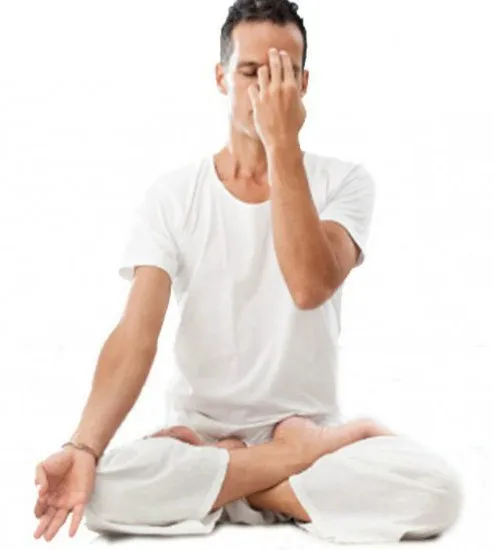
Frequently Asked Questions
Question: What is Depression?
Answer: Depression is a diseased condition in which the person’s mood is affected and suffers from depressed mood and pessimism, increased fatigability, reduced energy, loss of interest and enjoyment are present along with other symptoms
Question: What are the causes of Depression?
Answer: Depressive disorders in children does not have one specific cause. Rather, people with these conditions tend to have a number of biological, psychological, and environmental contributors to its development
Question: What is the Ayurvedic treatment for Depression?
Answer: Treatment should be through logical use of medicines and modification of Ahara and Vihara to suit the needs of the person. The patient should be encouraged to follow proper dietary regimen, follow rules of Sadvrita,(good conduct code), to use Medhya Rasayana (medicines that boost psyche) and Doshahara Ousadha (medicines) to control the imbalanced mind.
Dr. Gupta’s IAFA offers effective Ayurvedic Management for Depression in children. IAFA is committed towards providing the outstanding service for all the health problems of your children through Ayurveda.
Better health of children, Better future!!! Think about Dr.Gupta’s IAFA!!!
Was this Page Helpful?
So IAFA Ayurvedic Management for Depression in Children is Just 3 Steps Away!

01. Connect With Us
Book an appointment to share queries of your child health.

02. Consult With Us
Consult with Ayurvedic Pediatrician of IAFA®.

03. Root Cause Treatment
Get an accurate diagnosis and treatment for your child.
Depression- Case Studies
Real Case Studies of Successfully Treated Patients from All Around the World by IAFA Ayurveda®
-
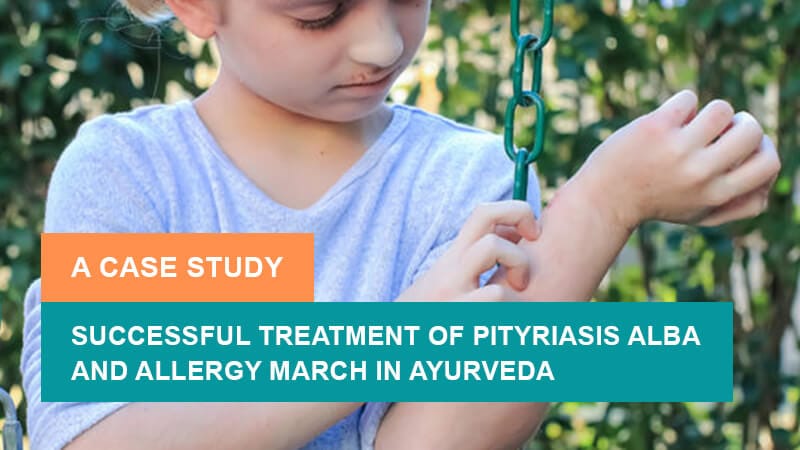
Successful Treatment of Pityriasis Alba and Allergy March in Ayurveda – A Case Study
It is a case study about successful treatment of Pityriasis Alba and…
-

Successful Treatment of Gallstones (Cholelithiasis) with Ayurvedic Medications – A Case Study
It is a case study about the successful treatment of Gallstones (Cholelithiasis)…
-
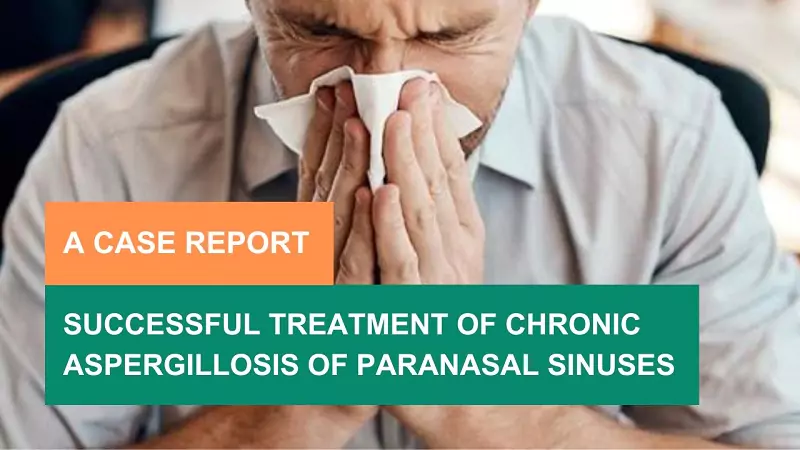
48-Year-Old Male Patient Got Relief from Chronic Aspergillosis of Paranasal Sinuses – A Case Study
Fungal infections can be treated with a high success rate by various…
-
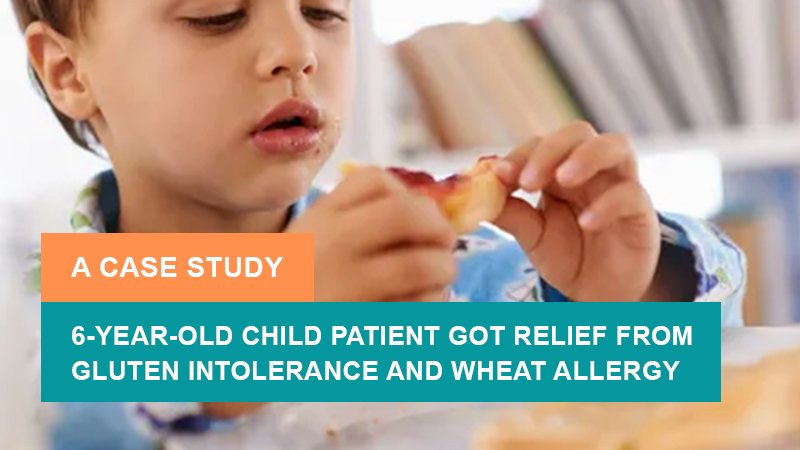
6-Year-Old Child Patient Got Relief from Gluten Intolerance and Wheat Allergy – A Case Study
It is a case study of a 6-year-old Child Patient who got…
Read More Articles
-
-
-
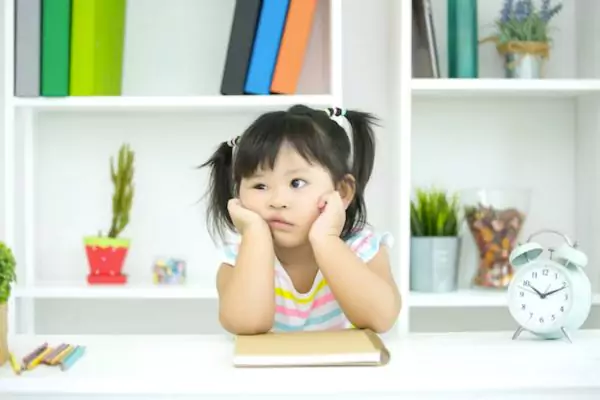
Attention Deficit Hyperactivity Disorder – ADHD (Vatika Unmada)
So IAFA Root-Cause Treatment of Your Attention Deficit Hyperactivity Disorder is Just…

